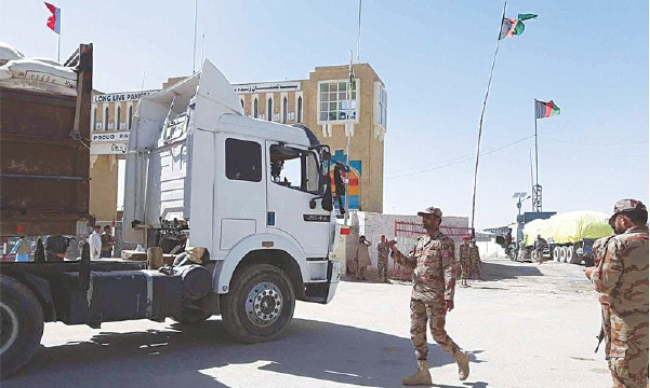KABUL - Although a phytosanitary certificate is a must for imported products, some of such items continue to be smuggled into Afghanistan, officials say.
Around 250 containers with different items such as fruits, vegetables, medicines, livestock and others enter Afghanistan daily via the Chaman border crossing.
However, officials allege, these items find their way into the country through illegal routes without phytosanitary certificates.
There is not a single laboratory in Afghanistan for testing food items to ascertain whether or not they are fit for human consumption.
ZabihullahZyarmal, in charge of the agriculture product quarantine department, said their responsibility was to check and quarantine agriculture products in the border town of Spin Boldak.
He said the Pakistani products are quarantined after checking the phytosanitary certificate and then proceeded to custom department.
He, however, alleged substandard vegetables, fruits and medicines were being smuggled into the country.
Zyarmal said efforts were being made to stop the practice but due to the long and porous border between the two countries, the illegal transfer of such items could not be controlled.
Earlier, he explained, no phytosanitary certificate was required. But when Afghanistan made Pakistani products’ import conditional on phytosanitary certificates, Islamabad took a similar step.
He said the principle demand was that all the imported goods specially the vegetables and fruits should be examined in the lab besides having the phytosanitary certificate.
He said efforts for the construction of modern and equipped livestock and agriculture laboratory in Spinboldak were being launched. Machinery for the laboratory had arrived and would be soon made functional. The World Bank is assisting the project, he said.
Zyrmal said employees for the laboratory had been trained and the facility would start working with the new solar year.
Once the laboratory was made functional all products besides having phytosanitary certificate would be examined for its quality in the lab, he added.
Agriculture official Eng. MohammadullahNoori said they were duty-bound to check and quarantine products.
He said over 250 trucks delivered livestock and agriculture products to Afghanistan from Pakistan. These products were never allowed entry without phytosanitary certificates.
Noori acknowledged agriculture and livestock products entered Afghanistan via illegal routes and its prevention was difficult.
He stressed the need for the establishment of a proper laboratory in Kandahar and warned the use of unexamined products was a hazard.
The official recalled a fly-disease incident, which was caused by items transferred to Kandahar from Iran. Pomegranate were infected with the fly disease.
He also reminded of the melon-fly disease coming from Pakistan to Afghanistan. He said the disease never existed in Afghanistan before. But now the melon crop in Kandahar is affected every year.
Noori, too, spoke of unfit poultry feed imports from Pakistan. Around 15,000 chickens were killed in Afghanistan by the hazardous feed. He has repeatedly informed relevant organs about the problems.
In addition to large-scale commercial goods, Afghanistan also imports chicken meat, eggs, livestock and around 60 to 70 trucks of live chickens on a daily basis.
Haji Nanai Agha, head of Fresh Fruit Association in Kandahar, said a phytosanitary certificate was not required for trade between Afghanistan and Pakistan in the past.
However, now it is mandatory. He said Kandahar fresh fruit traders must have this certificate. But some food items, fruits and other goods were smuggled into Afghanistan.
Kandahar residents say they often see food items of low quality in the market. HayatullahSrak, a resident of the Mirwais Mina area of Kandahar City, complained Pakistani food items were not healthy or standard.
Most of these goods are imported through legal routes and some smuggled into Afghanistan. The officials concerned should activate an advanced laboratory in Kandahar so all the goods imported should be analyzed and health guaranteed.
He said despite the ban, substandard wheat continued to be imported.
Earlier, Kandahar officials had banned meat imports from Pakistan, warning of taking punitive action against those violating the order.
Kandahar Butchers Association, meanwhile, said unhygienic meat was still being imported from Pakistan.
They said the meat was not imported through legal routes but smuggled into the country. Custom officials and security organs should stop the practice, they suggested.
Syed Ahmad Silab, a provincial council member, told Pajhwok he had personally taken action to deal with the problem.
He claimed they recently seized a vehicle full of meat imported from Pakistan. Some of the meat was of dead, ill and haram animals that caused many diseases, he charged.
Silab is working jointly with the officials concerned to enforce phytosanitary certification on all imported food items and activate a laboratory in Kandahar to test their quality.
Not only food items, but medicines are also smuggled into Afghanistan.
The Ministry of Public Health (MoPH) also acknowledged most of medicines were trafficked into Afghanistan from neighbouring countries. The ministry says it is trying to control borders and ban medicine smuggling.
Dr. Najia Tariq, deputy minister of public health who recently traveled to Kandahar province, regretted most of medicines were smuggled into Afghanistan due to the country’s porous borders.
She said medicines arrived in Afghanistan in ordinary vehicles rather than in refrigerated ones. As a result, their quality was harmed by high temperatures and other seasonal effects.
However, she warned of tightening supervising control over the import of medicines and opening a laboratory to analyse the quality and food items and drugs. (Pajhwok)
Home » Afghanistan » Sans Phytosanitary Certificate, Pak Products Enter Afghanistan
Sans Phytosanitary Certificate, Pak Products Enter Afghanistan

